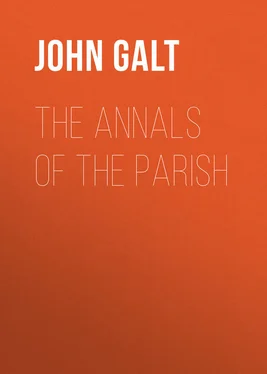John Galt - The Annals of the Parish
Здесь есть возможность читать онлайн «John Galt - The Annals of the Parish» — ознакомительный отрывок электронной книги совершенно бесплатно, а после прочтения отрывка купить полную версию. В некоторых случаях можно слушать аудио, скачать через торрент в формате fb2 и присутствует краткое содержание. Жанр: foreign_antique, foreign_prose, на английском языке. Описание произведения, (предисловие) а так же отзывы посетителей доступны на портале библиотеки ЛибКат.
- Название:The Annals of the Parish
- Автор:
- Жанр:
- Год:неизвестен
- ISBN:нет данных
- Рейтинг книги:3 / 5. Голосов: 1
-
Избранное:Добавить в избранное
- Отзывы:
-
Ваша оценка:
- 60
- 1
- 2
- 3
- 4
- 5
The Annals of the Parish: краткое содержание, описание и аннотация
Предлагаем к чтению аннотацию, описание, краткое содержание или предисловие (зависит от того, что написал сам автор книги «The Annals of the Parish»). Если вы не нашли необходимую информацию о книге — напишите в комментариях, мы постараемся отыскать её.
The Annals of the Parish — читать онлайн ознакомительный отрывок
Ниже представлен текст книги, разбитый по страницам. Система сохранения места последней прочитанной страницы, позволяет с удобством читать онлайн бесплатно книгу «The Annals of the Parish», без необходимости каждый раз заново искать на чём Вы остановились. Поставьте закладку, и сможете в любой момент перейти на страницу, на которой закончили чтение.
Интервал:
Закладка:
But the most memorable thing that befell among my people this year, was the burning of the lint-mill on the Lugton water, which happened, of all the days of the year, on the very selfsame day that Miss Girzie Gilchrist, better known as Lady Skimmilk, hired the chaise from Mrs. Watts of the New Inns of Irville, to go with her brother, the major, to consult the faculty in Edinburgh concerning his complaints. For, as the chaise was coming by the mill, William Huckle, the miller that was, came flying out of the mill like a demented man, crying fire! – and it was the driver that brought the melancholy tidings to the clachan – and melancholy they were; for the mill was utterly destroyed, and in it not a little of all that year’s crop of lint in our parish. The first Mrs. Balwhidder lost upwards of twelve stone, which we had raised on the glebe with no small pains, watering it in the drouth, as it was intended for sarking to ourselves, and sheets and napery. A great loss indeed it was, and the vexation thereof had a visible effect on Mrs. Balwhidder’s health, which from the spring had been in a dwining way. But for it, I think she might have wrestled through the winter: however, it was ordered otherwise, and she was removed from mine to Abraham’s bosom on Christmas-day, and buried on Hogmanay, for it was thought uncanny to have a dead corpse in the house on the new-year’s day. She was a worthy woman, studying with all her capacity to win the hearts of my people towards me – in the which good work she prospered greatly; so that, when she died, there was not a single soul in the parish that was not contented with both my walk and conversation. Nothing could be more peaceable than the way we lived together. Her brother Andrew, a fine lad, I had sent to the college at Glasgow, at my own cost; and when he came out to the burial, he stayed with me a month, for the manse after her decease was very dull, and it was during this visit that he gave me an inkling of his wish to go out to India as a cadet, but the transactions anent that fall within the scope of another year – as well as what relates to her headstone, and the epitaph in metre, which I indicated myself thereon; John Truel the mason carving the same, as may be seen in the kirkyard, where it wants a little reparation and setting upright, having settled the wrong way when the second Mrs. Balwhidder was laid by her side. – But I must not here enter upon an anticipation.
CHAPTER V
YEAR 1764
This year well deserved the name of the monumental year in our parish; for the young laird of the Breadland, that had been my pupil, being learning to be an advocate among the faculty in Edinburgh, with his lady mother, who had removed thither with the young ladies her daughters, for the benefit of education, sent out to be put up in the kirk, under the loft over the family vault, an elegant marble headstone, with an epitaph engraven thereon, in fair Latin, setting forth many excellent qualities which the old laird, my patron that was, the inditer thereof said he possessed. I say the inditer, because it couldna have been the young laird himself, although he got the credit o’t on the stone, for he was nae daub in my aught at the Latin or any other language. However, he might improve himself at Edinburgh, where a’ manner of genteel things were then to be got at an easy rate, and doubtless the young laird got a probationer at the College to write the epitaph; but I have often wondered sin’ syne, how he came to make it in Latin, for assuredly his dead parent, if he could have seen it, could not have read a single word o’t, notwithstanding it was so vaunty about his virtues, and other civil and hospitable qualifications.
The coming of the laird’s monumental stone had a great effect on me, then in a state of deep despondency for the loss of the first Mrs. Balwhidder; and I thought I could not do a better thing, just by way of diversion in my heavy sorrow, than to get a well-shapen headstone made for her – which, as I have hinted at in the record of the last year, was done and set up. But a headstone without an epitaph, is no better than a body without the breath of life in’t; and so it behoved me to make a poesy for the monument, the which I conned and pondered upon for many days. I thought as Mrs. Balwhidder, worthy woman as she was, did not understand the Latin tongue, it would not do to put on what I had to say in that language, as the laird had done – nor indeed would it have been easy, as I found upon the experimenting, to tell what I had to tell in Latin, which is naturally a crabbed language, and very difficult to write properly. I therefore, after mentioning her age and the dates of her birth and departure, composed in sedate poetry the following epitaph, which may yet be seen on the tombstone.
A lovely Christian, spouse, and friend,
Pleasant in life, and at her end. —
A pale consumption dealt the blow
That laid her here, with dust below.
Sore was the cough that shook her frame;
That cough her patience did proclaim —
And as she drew her latest breath,
She said, “The Lord is sweet in death.”
O pious reader! standing by,
Learn like this gentle one to die.
The grass doth grow and fade away,
And time runs out by night and day;
The King of Terrors has command
To strike us with his dart in hand.
Go where we will by flood or field,
He will pursue and make us yield.
But though to him we must resign
The vesture of our part divine,
There is a jewel in our trust,
That will not perish in the dust,
A pearl of price, a precious gem,
Ordained for Jesus’ diadem;
Therefore, be holy while you can,
And think upon the doom of man.
Repent in time and sin no more,
That when the strife of life is o’er,
On wings of love your soul may rise,
To dwell with angels in the skies,
Where psalms are sung eternally,
And martyrs ne’er again shall die;
But with the saints still bask in bliss,
And drink the cup of blessedness.
This was greatly thought of at the time, and Mr. Lorimore, who had a nerve for poesy himself in his younger years, was of opinion that it was so much to the purpose, and suitable withal, that he made his scholars write it out for their examination copies, at the reading whereof before the heritors, when the examination of the school came round, the tear came into my eye, and every one present sympathized with me in my great affliction for the loss of the first Mrs. Balwhidder.
Andrew Langshaw, as I have recorded, having come from the Glasgow College to the burial of his sister, my wife that was, stayed with me a month to keep me company; and staying with me, he was a great cordial, for the weather was wet and sleety, and the nights were stormy, so that I could go little out, and few of the elders came in, they being at that time old men in a feckless condition, not at all qualified to warsle with the blasts of winter. But when Andrew left me to go back to his classes, I was eerie and lonesome; and but for the getting of the monument ready, which was a blessed entertainment to me in those dreary nights, with consulting anent the shape of it with John Truel, and meditating on the verse for the epitaph, I might have gone altogether demented. However, it pleased Him, who is the surety of the sinner, to help me through the Slough of Despond, and to set my feet on firm land, establishing my way thereon.
But the work of the monument, and the epitaph, could not endure for a constancy, and after it was done, I was again in great danger of sinking into the hypochonderies a second time. However, I was enabled to fight with my affliction, and by-and-by, as the spring began to open her green lattice, and to set out her flower-pots to the sunshine, and the time of the singing of birds was come, I became more composed, and like myself, so I often walked in the fields, and held communion with nature, and wondered at the mysteries thereof.
Читать дальшеИнтервал:
Закладка:
Похожие книги на «The Annals of the Parish»
Представляем Вашему вниманию похожие книги на «The Annals of the Parish» списком для выбора. Мы отобрали схожую по названию и смыслу литературу в надежде предоставить читателям больше вариантов отыскать новые, интересные, ещё непрочитанные произведения.
Обсуждение, отзывы о книге «The Annals of the Parish» и просто собственные мнения читателей. Оставьте ваши комментарии, напишите, что Вы думаете о произведении, его смысле или главных героях. Укажите что конкретно понравилось, а что нет, и почему Вы так считаете.












